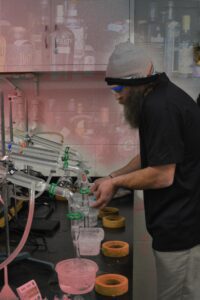
When it comes to proofing spirits, Brewing and Distilling Analytical Services (BDAS) in Lexington, KY and Denver, CO are experts. Our chemists are TTB certified in wine, spirits, and beer; and continuously participate in proficiency testing to remain in compliance by the certifying body.
All spirits go through at least two procedures – fermentation and distillation. Fermentation is where all alcohol is created, distillation is where the alcohol is separated and removed. Distilling is essentially the process whereby a liquid made of two or more parts is separated into smaller parts of desired purity by the addition and subtraction of heat from the mixture.
Brewing and Distilling Analytical Services (BDAS) has the ability to test throughout the distillation process, from mash process testing to finished product testing. If we find a problem, we’ll pinpoint it and help you solve it. With our world-class specification testing, we’re able to identify changes in your distillation process and we can help you troubleshoot if those changes are affecting the quality of your product or its flavor.
In proofing spirits, it’s important that distillers of these products have them accurately tested to determine actual alcohol content. While it is standard practice to measure alcohol content in any alcoholic beverage, the most popular method for proofing spirits is lab-scale distillation. BDAS uses distillation in our alcohol by volume (ABV) testing, which is a measure of the alcohol content in a specific volume of a beverage. This test determines how many milliliters of ethanol are present in 100 milliliters of a liquid, and results are reported as both a percentage and a proof value.
The beverage industry is incredibly diverse and fast moving, pivoting constantly as new consumer trends emerge. That’s why partnering with a third-party beverage testing laboratory that provides fast, accurate, and comprehensive solutions is key. Our experts at BDAS can support you through the entire product life cycle from concept to commercialization. We understand that not all beverages are the same. Let us tailor our solutions to meet your goals. We stand ready to support you with industry-leading technologies, state-of-the-art laboratories, and easy access to experts when challenging situations occur.
The alcohol content of a distilled spirit typically refers to the amount of ethyl alcohol, as opposed to higher or fusel alcohols. The analysis of the spirit for alcohol content is an important part of distilling laboratory work for quality assurance programs and for legal reporting purposes. Normal alcohol proof is less than the initial amount that sparked the term. Today, anything in the range of 40-100 proof is considered normal. Higher than that and spirits begin to approach flammability. High proof alcohols are dangerous for consumption. Each type of spirit has a normal or typical proof. Rum, tequila, gin, vodka, and whiskey are typically 80 proof, though different batches can vary. Though some liquors, mainly rums and vodkas, can seem abnormal due to their very high proofs, these are still normal in the sense that they are legally allowed to be produced.
For more information about proofing spirits at Brewing and Distilling Analytical Services (BDAS), contact us in Lexington, Kentucky at (859) 278-2533 or in Denver, Colorado at (720) 450-7066.